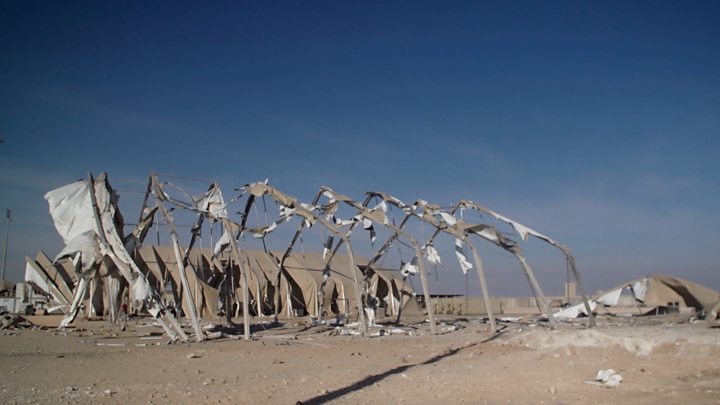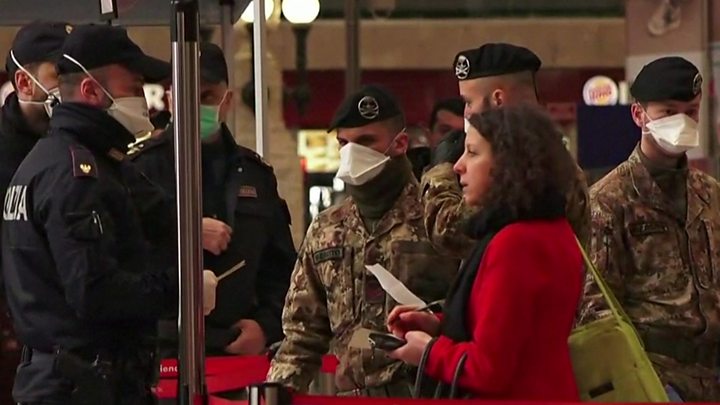Two more people have died after testing positive for coronavirus, bringing the total number of UK deaths to 10.
There are now 590 confirmed cases in the UK, up from 456 on Wednesday - with 491 in England, 60 in Scotland, 20 in Northern Ireland and 19 in Wales.
It comes as the government is expected to announce within hours that it is stepping up its coronavirus response.
It is anticipated the UK will switch to tactics aimed at delaying its spread, rather than containing it.
The latest two deaths were an 89-year-old at Charing Cross Hospital in London and a woman in her 60s at Queen's Hospital in Romford, NHS England said. They both had underlying health conditions.
A total of 29,764 people have been tested for the virus in the UK so far.
Thursday's rise in confirmed cases - of 134 - was the first time the day-on-day increase has been more than 100.
Meanwhile, the World Health Organization has labelled the outbreak of the disease as a pandemic.
Schools, colleges and other public facilities in the Republic of Ireland are to close until 29 March.
Scotland's First Minister Nicola Sturgeon has called for the cancellation of mass gatherings of 500 people or more.
She told the Scottish Parliament she will discuss this at the emergency Cobra meeting.
Overnight, US President Donald Trump suspended travel to the US from 26 European countries - but not the UK or Ireland.
In other developments:
- Three Leicester City players have self-isolated after showing symptoms of coronavirus
- Scottish Secretary Alister Jack suggested new UK measures could include requiring people to stay at home if they have a raised temperature combined with symptoms of a cold
- Barchester, which runs more than 200 care homes across the UK, has asked visitors to stay away
- A cabinet minister was confirmed as being in self-isolation while awaiting test results after coming into contact with minister Nadine Dorries, who has tested positive for the virus
- The Italian government forced all shops except food stores and pharmacies to close as the country strengthens its lockdown due to the virus
- Real Madrid footballers have gone into quarantine after a basketball player who shares training facilities with the La Liga club tested positive for the virus
- McLaren have withdrawn from this weekend's Australian Grand Prix after a team member tested positive
- Princess Cruises, which has seen more than 700 cases of the disease reported on its cruise ships, has paused operations until 10 May
Prime Minister Boris Johnson is expected to sign off plans to move from the "containment" phase of the outbreak to "delay" at the Cobra meeting later.
The UK is currently in the "containment" phase - the first stage of the government's four-part plan:
- Containment
- Delay
- Mitigation
- Research - which runs alongside the other phases
Delay is where "social distancing" measures will be considered - which could include restrictions on public gatherings above a certain number of people, although this is not thought likely at this stage.
The move could also result in people who show even minor signs of respiratory tract infections - such as a cough - or a fever soon being told to self-isolate.
Speaking to BBC News, deputy chief medical officer for England Dr Jenny Harries said the introduction of social distancing measures should come at "exactly the right time".
She also warned that members of the public wearing face masks could be putting themselves at more risk of contracting the virus - if they touch it with unwashed hands or put it on a surface they have not cleaned.
"You can actually trap the virus in the mask and start breathing it in," she said.
Where are we heading?
The move to delay is an acknowledgement the virus cannot be contained. This is not unexpected given health officials have been clear in the past week or so that we should expect widespread community transmission.
The key now is how quickly, and by how much, cases start to rise.
A good scenario given the circumstances would be for infections to climb gradually over the coming months and for the peak weeks - where the risk is that half the overall cases could come quickly - to be kept under control.
That will allow the health service to manage as best it can.
The government has a range of powers at its disposal.
But expect the most drastic to be reserved for just before the peak. The focus of today's advice is expected to be how the vulnerable can be protected - the elderly and those with underlying health conditions.
Chancellor Rishi Sunak told BBC Breakfast any new measures would seek to protect people who are especially vulnerable and would be "guided by the science".
"We now believe the virus could spread significantly," he said.

Media playback is unsupported on your device
Mr Sunak told BBC Radio 4's Today programme that blanket bans on foreign travel like that imposed by the US are unlikely to have a "material effect" on the spread of infection.
He said the UK government was "looking at interventions that provide very high clinical benefit and minimise the social impact".
The delay phase aims to lower the peak impact of the virus and push it away from the winter season - when pressures on the NHS are more acute because of issues including seasonal flu.
Delaying the outbreak's impact could also buy time for the testing of drugs and development of vaccines and/or improved therapies or tests to help reduce the impact of the disease.
The Cobra committee last met on Monday, when it was decided the UK should remain in the containment phase.
On Wednesday, in his first Budget, Mr Sunak pledged billions of pounds of investment to get the country through the coronavirus outbreak, as well as saying the NHS would get "whatever resources it needs".
Meanwhile the Lib Dems and Plaid Cymru have cancelled their respective spring conferences.
In response to the World Health Organization labelling the outbreak of the disease a pandemic, the UK's chief medical adviser Prof Chris Whitty tweeted that the UK "had been planning" for this situation.
NHS Providers chief executive Chris Hopson told BBC Newsnight that alternative areas like operating theatres and recovery rooms could be adapted to help cope with increased hospital admissions.
He said: "The idea that we've got a fixed number of beds and capacity is not right."
'It's a horrible feeling'
Alison Cameron, 53, is one of 15 people in the London borough of Kensington and Chelsea to have been diagnosed with the disease.
She contacted NHS 111 after she began finding it difficult to breathe.
"I feel really unwell. I am currently in isolation. It is not pleasant," she said, adding: "At the heart of it I feel like death on legs."
She believes she contracted the virus after a chance meeting with someone who was subsequently diagnosed with it.
"It's a horrible feeling not being able to go out and it is quite frightening," she said. "I am more worried about my neighbours because they are quite vulnerable too."
What is happening elsewhere?
US President Donald Trump announced sweeping new travel restrictions on Europe in a bid to combat the spread of the virus.
The ban applies to anyone who has been in the EU's Schengen border-free area within 14 days prior to their arrival in the US. The travel order does not apply to US citizens.
The UK Foreign Office issued a travel update for British nationals in Italy, urging all remaining tourists to contact their airline operators and return to the UK.
It came as the number of confirmed cases in Italy rose to more than 12,000 with a death toll of 827.
What are your experiences relating to the coronavirus outbreak? Share your experiences by emailing haveyoursay@bbc.co.uk.
Please include a contact number if you are willing to speak to a BBC journalist. You can also contact us in the following ways:
https://news.google.com/__i/rss/rd/articles/CBMiJGh0dHBzOi8vd3d3LmJiYy5jb20vbmV3cy91ay01MTg0NTg2MdIBKGh0dHBzOi8vd3d3LmJiYy5jb20vbmV3cy9hbXAvdWstNTE4NDU4NjE?oc=5
2020-03-12 14:41:26Z
52780660066279




